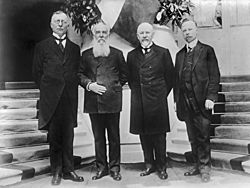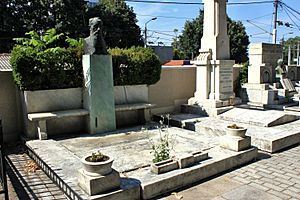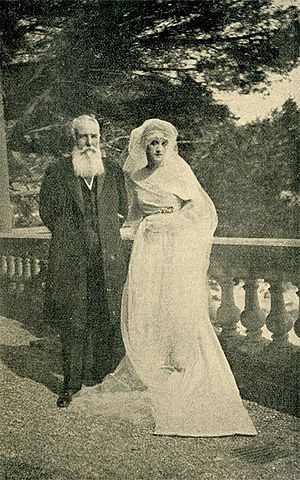Nikola Pašić facts for kids
Quick facts for kids
Nikola Pašić
Никола Пашић |
|
|---|---|
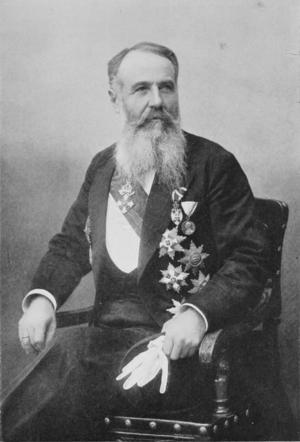
Pašić, c. 1914
|
|
| 4th Prime Minister of Yugoslavia | |
| In office 6 November 1924 – 8 April 1926 |
|
| Monarch | Alexander I |
| Preceded by | Ljubomir Davidović |
| Succeeded by | Nikola Uzunović |
| In office 1 January 1921 – 28 July 1924 |
|
| Monarch | Peter I Alexander I |
| Preceded by | Milenko Vesnić |
| Succeeded by | Ljubomir Davidović |
| In office 1 December 1918 – 22 December 1918 Acting |
|
| Monarch | Peter I |
| Preceded by | Position established |
| Succeeded by | Stojan Protić |
| Prime Minister of Serbia | |
| In office 12 September 1912 – 1 December 1918 |
|
| Monarch | Peter I |
| Preceded by | Marko Trifković |
| Succeeded by | Position abolished |
| In office 24 October 1909 – 4 July 1911 |
|
| Monarch | Peter I |
| Preceded by | Stojan Novaković |
| Succeeded by | Milovan Milovanović |
| In office 29 April 1906 – 20 July 1908 |
|
| Monarch | Peter I |
| Preceded by | Sava Grujić |
| Succeeded by | Petar Velimirović |
| In office 10 December 1904 – 28 May 1905 |
|
| Monarch | Peter I |
| Preceded by | Sava Grujić |
| Succeeded by | Ljubomir Stojanović |
| In office 23 February 1891 – 22 August 1892 |
|
| Monarch | Alexander I |
| Preceded by | Sava Grujić |
| Succeeded by | Jovan Avakumović |
| Personal details | |
| Born | 18 December 1845 Zaječar, Serbia |
| Died | 10 December 1926 (aged 80) Belgrade, Kingdom of Serbs, Croats and Slovenes |
| Resting place | New Cemetery |
| Political party | People's Radical Party |
| Spouse | Đurđina Duković |
| Children | 3 |
| Alma mater | Belgrade Higher School Federal Polytechnic School |
| Signature | |
Nikola Pašić (Serbian Cyrillic: Никола Пашић; 18 December 1845 – 10 December 1926) was a very important Serbian and Yugoslav politician. He was a leading figure in politics for almost 40 years. He led the People's Radical Party. Pašić served as mayor of Belgrade twice (1890–91 and 1897). He was also Prime Minister of the Kingdom of Serbia many times (1891–92, 1904–05, 1906–08, 1909–11, 1912–18). Later, he became Prime Minister of the Kingdom of Yugoslavia (1918, 1921–24, 1924–26).
He was a key politician in the Balkans. Pašić, like other leaders such as Eleftherios Venizelos in Greece, helped make their new countries stronger. They worked to protect their nations from outside influences. This included powerful empires like Austria-Hungary, the Ottoman Empire, and the Russian Empire.
Contents
Early Life and Education
Pašić was born in Zaječar, which was then part of the Principality of Serbia. Some historians believe his family came from the Tetovo region in the 1500s. Others suggest his family settled near Zaječar more recently.
He went to elementary school in Zaječar. He then attended high school in Negotin and Kragujevac. In 1865, he started studying at the Belgrade Higher School. In 1867, he received a scholarship from the government. This allowed him to study railroad engineering at the Polytechnical School in Zürich, Switzerland.
Historians describe Pašić as a serious student. He studied more than just his required subjects. His early ideas about society were shaped by German thinkers. He graduated as an engineer. However, he only worked briefly on a railroad project. He mostly focused on politics instead.
Rise of the Radical Party
Student Activism and Party Formation
While studying in Zürich, Pašić became involved in politics. He lived near other Serbian students. Many of these students later became important in Serbia's socialist and radical movements. One key person was Svetozar Marković, a major socialist thinker. Pašić joined them and became an early member of the "Radical Party."
After returning to Serbia, Pašić supported an uprising against the Ottoman Empire in Bosnia. The socialists started publishing a newspaper called Samouprava. This paper later became the official voice of the Radical Party. After Marković passed away in 1875, Pašić became the leader of the movement. In 1878, he was elected to the National Assembly of Serbia. This happened even before the party was officially formed.
In 1880, Pašić did something new in Serbian politics. He created a group of opposition members in the assembly. Finally, the party's goals were written down in January 1881. The Radical Party was officially started. It was the first well-organized political party in Serbia, and Pašić was chosen as its first president.
The Timok Rebellion and Exile
The Radical Party and Pašić quickly became very popular. In the September 1883 elections, the Radicals won 54 percent of the votes. The Progressive Party, which King Milan Obrenović IV supported, only got 30 percent. Even with the Radicals' clear win, the king did not like Pašić. He chose a different person, Nikola Hristić, to form the government. The assembly refused to work with Hristić, and the meeting was stopped.
Tensions grew when Hristić tried to take away peasants' guns. This was to create a regular army. As a result, fighting started in eastern Serbia, in the Timok valley. King Milan blamed the Radicals for the unrest. He sent soldiers to stop the rebellion. Pašić had to flee to Hungary to avoid being arrested. He was sentenced to death while he was away. Many others were also punished.
For the next six years, Pašić lived in Bulgaria with relatives. The Bulgarian government supported him. He lived in Sofia and worked in construction. He also worked briefly for the Ministry of Interior. Some sources say he spoke Bulgarian well.
Bulgaria's support for Pašić was one reason King Milan started the Serbo-Bulgarian War in 1885. After Serbia lost the war, King Milan offered a pardon to many involved in the Timok rebellion. However, Pašić was not pardoned. He stayed in Bulgaria until King Milan gave up his throne in 1889. A few days later, the new Radical government pardoned Pašić, and he could return home.
Political Career: 1890–1903
Leading the Assembly and Belgrade
On 13 October 1889, Pašić was chosen to be the president of the National Assembly. He held this important role until 9 January 1892. He was also elected mayor of Belgrade from 11 January 1890 to 26 January 1891. As president of the assembly, many new laws were passed. As mayor of Belgrade, he helped pave the city's muddy streets. He was re-elected president of the National Assembly two more times (1893–1895 and 1897–1898). He also served as mayor of Belgrade again (1897).
Nikola Pašić became Prime Minister for the first time on 23 February 1891. However, former King Milan returned to Serbia in May 1890. He started working against Pašić and the Radicals again. In June 1892, one of the three regents (who ruled while King Alexander Obrenović V was young) passed away. The constitution said the assembly should choose a new regent. Pašić wanted an emergency meeting, but another powerful regent, Jovan Ristić, refused. Pašić then resigned as Prime Minister on 22 August 1892.
Challenges and Retirement
King Alexander took power early and dismissed the regency. He offered a moderate Radical, Lazar Dokić, to form a government. Pašić refused to join. To keep Pašić out of Serbian politics, King Alexander sent him to Saint Petersburg, Russia, as a special envoy from 1893 to 1894. In 1896, the king stopped Pašić from pushing for changes to the constitution.
From 1897, both King Milan and King Alexander ruled together. They both disliked Pašić. In 1898, they had him put in prison for nine months. This was because his newspaper, Samouprava, published a statement about his past opposition to King Milan. Pašić said he was misquoted, but it didn't help.
In June 1899, there was an attempt to harm former King Milan. Milan quickly blamed the Radical Party. All the leaders of the Radical Party, including Pašić, were arrested. Pašić had just been released from prison. There was no real proof that the Radicals or Pašić were involved. However, Milan insisted that Nikola Pašić be severely punished. Other countries, like Austria-Hungary, worried that punishing Pašić would cause problems with Russia. Pašić made a statement that helped calm the situation. He was sentenced to five years but was released right away. This event caused some disagreement within the Radical Party. Younger members felt Pašić had given in too easily. For the rest of King Alexander's rule, Pašić stayed out of politics.
Serbia's Golden Age: 1903–1914
New Beginnings and Growth
Nikola Pašić was not part of the group that planned to remove King Alexander. This event happened on the night of 10–11 June 1903. Both the King and Queen Draga Mašin were killed. The Radical Party did not form the first government after this event. However, after winning the elections on 4 October 1903, they stayed in power for almost 15 years.
At first, the Radicals did not want the new king, Peter I Karađorđević. They thought his appointment was against the law. But Pašić changed his mind. He saw that people accepted the new king. King Peter I was also a democratic and kind ruler. This was very different from the previous two kings.
Nikola Pašić became foreign minister in February 1904. He then led a government as Prime Minister from December 1904 to May 1905. During the next ten years, under Pašić and the Radical Party, Serbia became very successful. Many historians call this time the modern golden age of Serbia. The country grew into a European democracy. Its economy and political influence also grew. This caused problems with Austria-Hungary, Serbia's large neighbor. Austria-Hungary even wanted to make Serbia one of its provinces.
Economic Challenges and Alliances
Austria-Hungary tried to pressure Serbia by causing problems for its exports. Most Serbian goods went through Austria because Serbia had no sea access. When this didn't work, Austria-Hungary started a customs war in 1906. This meant they closed their borders to Serbian goods. Pašić formed another government from April 1906 to July 1908. Austria wanted Serbia to buy everything from Austrian companies. Pašić told them that he personally would agree, but the assembly was against it. In a democracy, the assembly's decision matters.
Closing the borders hurt Serbia's economy at first. But Pašić quickly found new markets in Western Europe. This made Serbia's economy even stronger than before. He also made sure that those involved in the 1903 political changes retired. This helped restore good relations with the United Kingdom. Serbia also bought cannons from France. During this time, Austria-Hungary officially took over Bosnia and Herzegovina in 1908. This caused big protests and instability in Serbia. But Pašić managed to calm things down.
The Balkan Wars and World War I
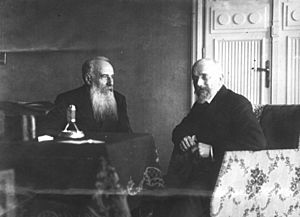
Pašić led two more governments (1909–1911 and from 1912). He was a key figure in forming the Balkan League. This alliance led to the First Balkan War (1912–13) and the Second Balkan War (1913). These wars almost doubled the size of Serbia. They brought back territories like Kosovo, Metohija, and Vardar Macedonia from the Ottoman Empire.
Pašić had disagreements with some military leaders. They disagreed on how to manage the newly gained territories. Pašić believed these areas should become part of Serbia's political system through democratic elections. The army wanted to keep them under military control. After a year of tension, Pašić removed the military administrator. He planned new elections for 1914, but World War I started before they could happen.
On 28 June 1914, Archduke Franz Ferdinand of Austria, the heir to Austria-Hungary, was killed in Sarajevo. The Austro-Hungarian government immediately blamed Serbia. Most historians agree that the Serbian government did not plan this. However, how much Pašić knew is still debated.
Austria-Hungary gave Serbia a very strict list of demands, called the July Ultimatum. It was written so that Serbia would likely refuse. After much discussion, Pašić told the Austrian ambassador that Serbia accepted almost all demands. However, Serbia could not allow Austrian police to conduct their own investigations freely in Serbia. Austria-Hungary responded by declaring war on Serbia on 28 July 1914.
World War I and the Birth of Yugoslavia
War Challenges and a New State
Many people thought Serbia would quickly lose the war against Austria-Hungary. But Serbia was well-prepared. After several battles in 1914–1915, the Austrian army retreated. On 5 July 1914, old King Peter I handed over his duties to his son, Alexander, who became the regent.
In September 1914, Pašić and Albanian leader Essad Pasha Toptani signed a secret agreement. This treaty focused on creating joint Serbian-Albanian political and military groups. It also planned for a railroad to Durres and financial support for Essad Pasha.
Unlike King Peter, Regent Alexander was not a fan of democracy. He disliked Pašić and his democratic ideas. An open disagreement started when Serbia was offered the London Pact. This pact would have given Serbia more land. However, it would also mean giving up part of Vardar Macedonia to Bulgaria. This was to get Bulgaria to join the war on the side of the Triple Entente. Both Pašić and Regent Alexander were against this. They felt it would betray the Croatians and Slovenians. Talks about creating a future South Slav state had already begun.
Serbia refused the pact. It was then attacked by Austria-Hungary, Germany, and Bulgaria. The Serbian government and army had to retreat through Albania to the Greek island of Corfu. There, the Corfu Declaration was signed in 1917. This document laid the groundwork for the future South Slav state of Yugoslavia.
Forming the Kingdom of Serbs, Croats and Slovenes
The Kingdom of Serbs, Croats and Slovenes (SHS) was officially declared on 1 December 1918. As Prime Minister of Serbia at the time, Pašić was seen as the leader of this new South Slav state. It was agreed that Pašić would continue as Prime Minister. However, because Regent Alexander disliked Pašić, he chose Stojan Protić to form the government instead. So, Pašić stepped down on 20 December 1918.
Even though he was no longer in government, Nikola Pašić was the main negotiator for the new state. He represented the country at the Paris Peace Conference of 1919. He worked to secure the best borders for the new kingdom. He managed to secure borders with Albania and Bulgaria. However, he could not get Fiume (which became an independent state) or most of Carinthia (which stayed part of Austria).
Elections on 28 November 1920 showed that the Radical Party was the second strongest. They had only one seat less than the Yugoslav Democratic Party. But Pašić managed to form a coalition government. He became Prime Minister again on 1 January 1921.
The Vidovdan Constitution
When discussions about the new state's constitution began, there were two very different ideas. Both Pašić and Regent Alexander wanted a single, unified state. Pašić believed that a federal state, where different regions had more power, might fall apart. The regent simply preferred to have more power himself.
Stjepan Radić, a leading Croatian politician, wanted a federal republic. He saw a joint Serbian-Croatian state as a temporary step towards Croatian independence. Since Pašić's party had the most votes in the assembly, a new constitution was announced on Vidovdan (St. Vitus day), 28 June 1921. This constitution made the Kingdom of the Serbs, Croats and Slovenes a parliamentary monarchy. It was very centralized, meaning most power was held by the central government. It removed much of the local self-rule that regions like Slovenia, Croatia, and Bosnia had. The government worked to keep the country united, though there were disagreements about how much power different regions should have.
Pašić remained Prime Minister until 8 April 1926. He had a short break from July to November 1924. After briefly giving the job to his party colleague Nikola Uzunović, King Alexander refused to reappoint Pašić. He used some issues involving Pašić's son as an excuse. The next day, on 10 December 1926, Nikola Pašić passed away in Belgrade. He was almost 81 years old. He was buried in Belgrade's New Cemetery.
Family Life
Nikola Pašić married Đurđina Duković. She was the daughter of a wealthy Serbian grain trader from Trieste. They got married in a Russian church in Florence. They had three children: a son named Radomir-Rade, and two daughters, Dara and Pava. Radomir-Rade had two sons: Vladislav, who was an architect, and Nicholas, who studied law at Oxford University. Nicholas lived in Toronto, Canada, and founded a Serbian National Academy.
Legacy
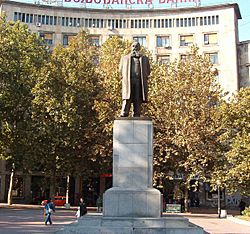
A main square in Belgrade is named after him, Square of Nikola Pašić. There is a 4.2-meter tall bronze statue of Pašić in the square. It stands overlooking the building of the assembly. He is also included in The 100 most prominent Serbs. Pašić received several important awards. These include the Russian Order of the White Eagle and the Order of Carol I from Romania. He also received the Order of Karađorđe's Star.
Media Portrayals
- In the 1995 TV show The End of Obrenović Dynasty, Nikola Pašić was played by actor Petar Kralj.
- The Last Audience, a TV show about Nikola Pašić's life, was made in 2008 by RTS.
See also
 In Spanish: Nikola Pašić para niños
In Spanish: Nikola Pašić para niños
 | Jessica Watkins |
 | Robert Henry Lawrence Jr. |
 | Mae Jemison |
 | Sian Proctor |
 | Guion Bluford |


